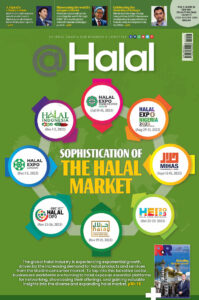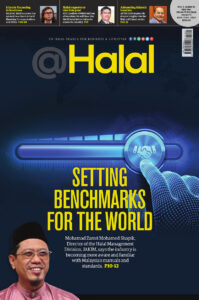The ‘Halal sustainability ecosystem’ theme ensures it meets today’s needs without jeopardising the ability of future generations.
It also guarantees a better quality of life, advancing technology and renewable energy to minimise the use of natural resources further.
Bringing exhibitors to expand, enhance, and strengthen their businesses in Eurasia, Malaysia Showcase organised the Kuala Lumpur-Istanbul Halal Industry Corridor webinar.
The webinar was in conjunction with the 8th OIC Halal Expo 2021 on Nov 25-28 at the Istanbul Congress Centre through collaboration between My Events International with Malaysia External Trade Development Corporation (MATRADE) and ASEAN Chamber of Commerce and Industry.
Being in the centre of the Southeast Asia region gives Malaysian businesses an extra edge in aligning their business objectives to optimise potential while minimising costs and risks.
“The halal food production, according to the majority of consumers, can be an excellent vehicle for promoting sustainable farming and agriculture,” highlighted Aizuddinur Zakaria, the organising chairman, in his welcoming remarks.
“Food safety, environment-friendliness, fair trade, and animal welfare are the most likely determinants associated with halal principles and production to aid in sustainable agriculture.
“Malaysia has a much longer halal certification history and is a prominent halal producer.”
Merve Safa Kavakci, Turkish Ambassador to Malaysia, said Turkey and Malaysia have the technical competence, human resources, experience, and motivation needed to realise projects in the halal sector with their top-notch quality infrastructure.
In a pre-recorded keynote address at the webinar, she emphasised that Malaysia and Turkey, strategically located countries, should be gateways to Europe and Southeast Asia.
“Discussing the concept of halal and halal certification, it is worth mentioning that not only Muslims but also non-Muslims consumers prefer halal-certified products and services due to the perception that they are clean and healthy,” said Kavakci.
“Every year, the halal products and services industry expands. Therefore, it is necessary to develop a reliable certification system that operates at a global scale for consumers to trust products and services claiming to be safe and for international commerce of these products to remain progressively free of technological hurdles.”
Turkey is Malaysia’s third-largest trading partner in the West Asia region, mainly driven by the Free Trade Agreement (FTA) that went into force in 2015, marginalising both countries’ unused trade potential.
“Just one year after the FTA, in 2016, our trade volume increased by 34 per cent and reached $2.6 billion. In 2017, our bilateral trade reached its highest value with $3.4 billion.
“It is remarkable that our trade volume, which has been around $2.5 billion since 2018, has increased by more than seven per cent even in 2020, the year of the pandemic,” added Kavakci.
Kavakci was pleased to see that the trade volume has increased by 46 per cent in the first six months of 2021, compared to the same period of the previous year.
She also expressed optimism that Turkish and Malaysian enterprises participating in the Halal Expo will converge to foster trade and economic connections in food and drinks, cosmetics, pharmaceuticals, tourism, Islamic finance, and modest fashion.
With significant economic opportunities for above-market growth, the fabric of Turkish society is shifting across the country, with a long-term trend of growing disposable incomes and improving living standards ongoing.
Palm oil is one of the most widely used food ingredients globally.
“It is being applied in about half of all packaged food products. Its sales growth in recent years has contributed significantly to economic growth and alleviating poverty in several developing countries”, said Dr Ruslan Abdullah, Director of Science, Environment, and Sustainability Division, MPOC, Malaysia.
“Palm oil is the most important vegetable oil crop in the world, commanding about 38 per cent of the total vegetable operation in the world.”
He pointed out that Malaysia had to continue to be a responsible contributor to food security when producing palm oil to remain competitive in the oil palm industry.
“It is always our aspiration to be a responsible producer that stresses sustainability, the importance of biodiversity control, conservation and the environment.
“We strive to provide the correct information, especially on applying the actual health benefits impact on biodiversity and environment to consumers around the world regarding oil palm further to continue to seek equal opportunity for all vegetables regardless of the origin.
“They only grow in the tropics, though, and their cultivation can negatively affect local populations and the environment,” added Dr Ruslan.
Fadzil Hashim, CEO of Brainy Bunch, believed it was essential to develop an interest in the Malaysian market and create the first unicorn.
“Turkey, which has 84 million users and annually receives 14 million foreign tourists, creates ample space for the marketing of various products.”
According to him, it is imperative to have a Malaysian unicorn develop a concept that further inspires investors to explore our ecosystem.
According to the Country Advisor of the Presidency of the Republic of Turkey Investment Office, Dr Bilal Ilhan, the Halal Corridor Initiative between Malaysia and Turkey has tremendous investment potential.
Over the last 18 years, Turkey was marked as the 11th largest economy in the vote in purchasing power parity terms, a jump from 18th in 2000.
Turkey was also one of the few economies in the world that recorded economic growth in 2020, which is the year Covid-19 emerged and hit the world economies hardest, registering 1.8 per cent economic growth.
Zooming into the main drivers of the economic growth in that time tells that industry players in the absolute economy trust the fundamentals and the future of the economy,
“The global halal market has risen to prominence in the global economy, with a stronghold in industrialised countries.”
The impressive economic growth trend maintains the momentum, even when the pandemic causes unprecedented pressures on the economic activity.
The Turkish economy expanded by almost 22 per cent year-on-year in the second quarter of 2021, which is the highest year-on-year quarterly growth.
In addition, the economy grew by almost one per cent quarterly, though facing historically the most adverse situations that put all economies under tight strain.
Malaysia has consistently adopted stringent regulatory, trade, and industry support measures to strengthen its trade-driven Islamic economic centre.
Global Ikhwan Service and Business Holdings (GISB) is a well-known food and beverage company with branches throughout Turkey.
Dato Lokman Hakim Pforten, Chief Executive Officer of GISB, shared their success story to enhance and push local Malaysian businesses to expand into a new friendly market like Turkey.
GISB has expanded into the prime area for tourists. It is approximately seven minutes walking distance from the Blue Mosque and from Hagia Sophia towards Grand Bazaar.
“So, before the pandemic, we received a good number of customers, especially from Malaysia, without even promoting our restaurant because whenever they walk from Blue Mosque or Hagia Sofia towards Grand Bazaar, they will surely pass our restaurant.
“Whenever they see a picture of teh tarik, roti canai, it attracts them to enjoy it after being in Turkey for quite some time.”
Aside from operating the restaurants, GISB ventured into other businesses, including importing poultry from Turkey to Malaysia and vice versa.
Thus, GISB expects more opportunities in business to come through connecting with other countries.








